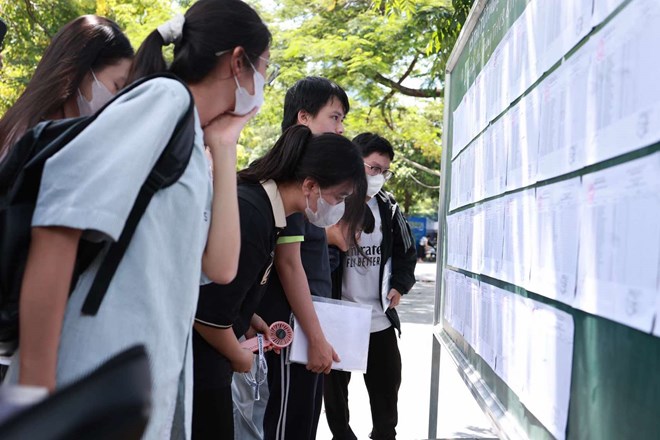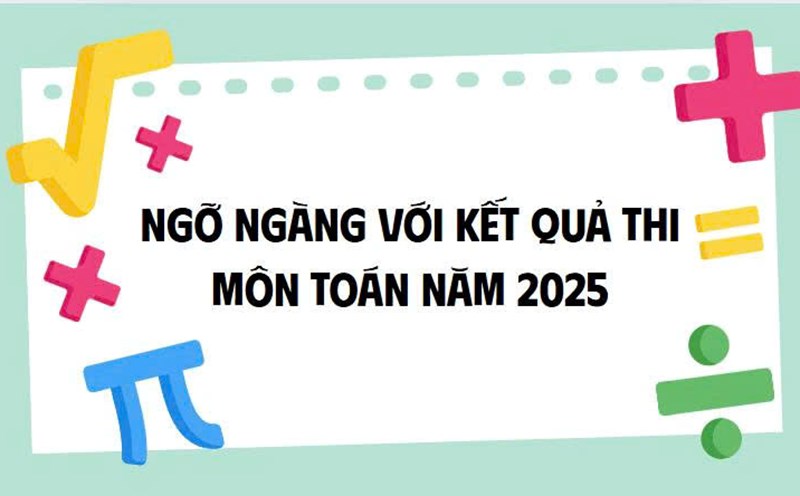The 2025 high school graduation exam scores are well differentiated, the university admission scores are expected to decrease by 2-3 points
Before the exam scoring review period, the Ministry of Education and Training (MOET) announced the scores for the 2025 high school graduation exam, with more than 15,300 exams achieving 10 points, an increase of about 4,400 exams compared to the previous year. Geography has the most absolute points, followed by Physics, History, Economic Education and Law. Math and English are considered difficult but still have 513 and more than 100 papers with a score of 10, showing students' ability to adapt quickly. Associate Professor, Dr. Nguyen Duc Son commented that the results reflect the positive changes in teaching according to the 2018 General Education Program.
Prof. Dr. Nguyen Dinh Duc - Chairman of the Council of the University of Technology, Vietnam National University, Hanoi - assessed that this year's high school has good differentiation, helping universities trust and use it for admission. He predicted that the university admission score will decrease in combinations with Math and English because the exam is difficult and the number of candidates choosing the English exam will decrease sharply. However, he said that the English proficiency of this year's contestants is better, although they are still about 38% below average.
This year's benchmark scores are expected to decrease by about 2-3 points compared to last year in many groups, especially those with Math and English; while groups such as C00 (Literature, History, Geography) have a slight difference. On the morning of July 16, candidates can look up their exam scores and register, adjust their university admission wishes until July 28. See more...
Time to announce the 2025 university entrance exam floor score
The Ministry of Education and Training announced the 2025 high school graduation exam score on the afternoon of July 15, immediately after which it held a conference to analyze the score and provide information from the National Steering Committee. The exam boards will send the results data to the Ministry before 5:00 p.m. on July 13 and announce the exam scores to candidates at 8:00 a.m. this morning (July 16). After having the results, candidates can look up the exam scores according to the instructions, and universities will announce the admission floor score threshold. For the pedagogical and pharmaceutical majors, the admission floor will be announced before 5:00 p.m. on July 23.

The 2025 high school graduation score includes 50% of the exam scores for subjects, 50% of the average high school transcript score, plus priority or incentive points (if any). Candidates who are eligible to take the exam, are not disciplined and have a graduation score of 5 or more will be recognized as graduating. The Departments of Education and Training and high schools will complete the graduation recognition review by July 18 and announce the results before July 20.
The test result certificate will be printed and sent to candidates no later than July 22. Candidates can submit an appeal from July 16 to July 25, and the organization of the appeal will be completed before August 3. See more...
Expected ceiling for public university tuition fees from the 2025 - 2026 school year
The Ministry of Education and Training is seeking opinions on a draft Decree regulating the mechanism for collecting, managing tuition fees and policies for exemption, reduction, and support for tuition fees and study costs. Accordingly, from the 2025 - 2026 school year, the tuition ceiling for public universities that have not yet covered their regular expenses will be specifically regulated, and from the 2027 - 2028 school year, it will be adjusted to the maximum not exceeding the growth rate of the consumer price index. The school ensures that regular expenses are collected up to twice the maximum; while the school ensures that investment expenses and regular expenses can be collected up to 2.5 times the ceiling.
For training programs that have been nationally or internationally quality-assessed, higher education institutions are allowed to decide on tuition fees, based on the socio-technical norms or professional costs, but must be public to learners and society. The draft also clearly distings the tuition fee between types of financial assurance, ensuring fairness and transparency.
Regarding vocational education, the draft stipulates similarly, with the tuition ceiling for college and intermediate programs at public institutions not yet guaranteed regular expenditures. Autonomous schools are allowed to collect higher tuition fees, but must publicize and maintain standard training programs within the tuition fees prescribed by the state to ensure public service function and access to education for all learners. See more...
Confidently choosing a career when understanding yourself and the labor market











